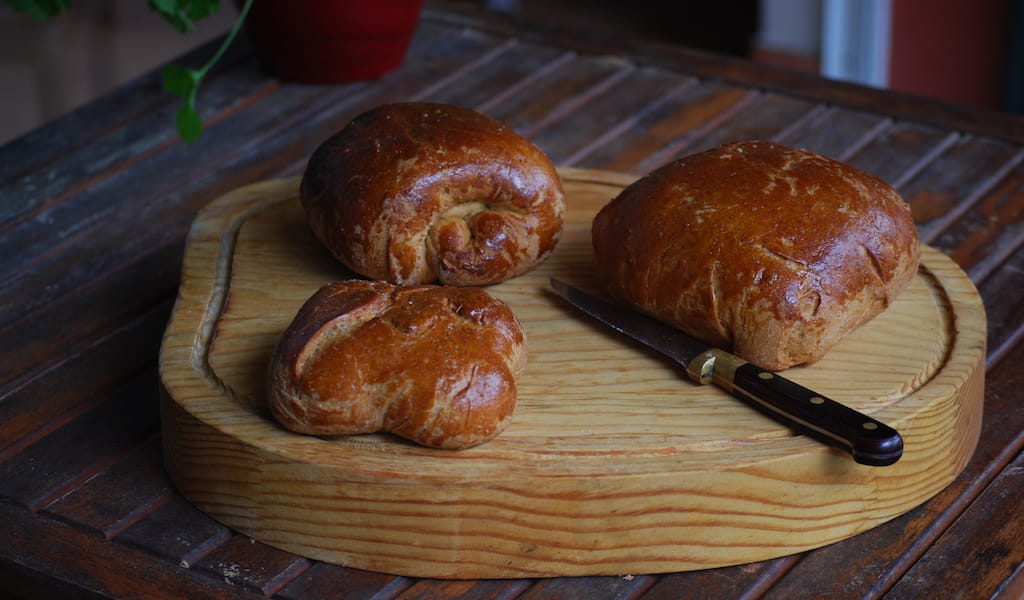My first reality shock with the quarantine and its food implications was when beans and chickpeas, both in tins and jars, started to disappear from the supermarket shelves. It was a sign of things to come.
Portugal has been on official lockdown since last Saturday, but most of us spent the week leading up to the announcement voluntarily at home. Now, we are only allowed to go out to buy food, go to the pharmacy, work out or walk the dog. I have been taking advantage of that last reason – the dog has never walked so much in his short life. Plus, he’s not complaining about this new reality of having humans all day in the apartment.
Being at home makes you think, probably too much. And if half of the brain is worried about the near future, the other half is worried about the next meal. If the first days left me anxious and almost with no appetite (something very rare indeed), now I’m always hungry and thinking about what to cook or bake next.
My mother is staying with me for the quarantine, and I’m being spoiled with her wonderful cooking – some of her recipes and advice are in the book Eat Portugal – The Essential Guide for Portuguese Food that I wrote with my friend Lucy Pepper some years ago, including the fava bean stew I’m sharing below with you.
But we need food, and sadly my pantry was not prepared for the coronavirus shutdown. Last Tuesday I had to get some staples of the Portuguese kitchen: salt cod (bacalhau), short grain rice (arroz carolino), sugar, eggs, tinned fish, vegetables and fruit. The lines were already long outside the supermarkets with entries limited to avoid crowds and any contact inside. I waited patiently but they didn’t have any bacalhau, rice, sugar or even eggs. All frozen foods were sold out too, except prawns. I did get cheese, lots of cheese, including my beloved requeijão (similar to ricotta). The whole shopping session was a bit nerve-wracking. You could see the fear in some people’s eyes. We all looked uncomfortable with our masks and gloves and checking out each other’s supplies. The friendliest of neighbors were suddenly avoiding you and others that never stopped to talk, not even for a “bom dia,” suddenly want to chat – with the required distance – and comment on the latest news.

Two days later, I had the idea of visiting my neighborhood market to get some much-needed fresh fish and some more supplies, mainly vegetables and bread. It was weirdly empty in a huge contrast with the supermarkets. The fish corridor had fewer vendors than usual and less variety but still a lot of fish to choose from. I got cuttlefish, hake, fava beans and a bunch of cilantro, plus potatoes, garlic, onions and (even more) cheese. Also bread, oranges from the Algarve and eggs. Most vendors were wearing masks and gloves, too.
I was so happy with my shopping that I couldn’t help cooking some fava beans with chouriço (the Portuguese kind is less fatty than Spanish chorizo). And with the requeijão that I bought in the supermarket, I made a tarte de requeijão (cheesecake) for the weekend, even if there isn’t much difference anymore between weekdays and weekends. I also found one kilo of rice for some emergency rice pudding (arroz doce is a nationwide comfort food).
Like my colleagues in Naples, Tbilisi, Istanbul, Athens and Marseille, I feel bereft without visiting cafés, pastelarias and restaurants. On top of this, where I live nobody delivers food except the least interesting pizza chain.
So in these times of stress and anxiety, food is blissful, a safe haven, and I’m so grateful that I can cook and put food on the table. Additionally, being with my mother makes everything more bearable even if we have some arguments, mostly in the kitchen…
We will get stronger after this tragic pandemic. And we will definitely all be fatter.
Paste de atum (Tuna paté)
If you have tinned tuna at home and have had enough of salads and sandwiches, here’s my recipe for a little petisco before dinner. I used tinned tuna from the Azores, my favorite and probably the best we can find in Portugal with organic olive oil.
1 tin of tuna
3 tablespoons of mayonnaise
Zest of one lemon
Juice of half a lemon
Oregano
Pinch of salt
Mash the tuna with a fork (if you use a blender the texture gets very mushy), add in the mayonnaise, the zest of an entire lemon, the juice of half a lemon, a pinch of salt (flor de sal, if you have it), a bunch of dried oregano and mix well. Serve with some oregano on top for decoration. Goes very well with some crackers and tomato slices and a glass of crisp vinho verde (or some dry white wine).
Favas à portuguesa (Broad bean stew)
Fava beans, or broad beans, are quite popular at this time of the year. Now in season, buy the ones still in pods as they are fresher. Plus, in times of quarantine, peeling the beans will keep you busy for a while.
Serves 4-6
2kg unpodded broad beans or 1.5kg podded broad beans
2 garlic cloves
2 onions
Coriander and mint
750g pork ribs
1 chouriço
1 black pudding
250g pork belly
Salt, sugar (makes the beans softer)
Fry the pork ribs, the pork belly in pieces and the chouriço in thick slices, in olive oil. Allow them to brown a little and then remove the meat from the pan.
Chop the onions, garlic, coriander and mint, and fry in the juices left over from the meat. Add the broad beans, lower the heat and let the beans cook slowly, covered with a lid. If it starts to dry out, add half a glass of water. Shake the pan from time to time. When the beans are almost done, add the fried meat and mix gently. Serve with a good green salad.

Tarte de requeijão (Baked cheesecake)
The Portuguese are known for having a sweet tooth, and the quarantine makes us salivate for cakes and pastries that we would normally get in the local pastelaria with a bica (an espresso). Baking has been affected by the lack of some ingredients, especially flour. This baked cheesecake, which is similar to queijadas de Sintra but without the pastry, only takes 2 tablespoons of flour.
500g requeijão (or ricotta)
300g sugar
3 eggs
2 egg yolks
2 tbsp flour
1 tsp cinnamon
Thoroughly beat all the ingredients together and use the blender to get rid of any lumps. Pour into a cake tin, buttered and lined with baking paper. Bake in the oven, pre-heated to 180°C, for about 30 minutes, until golden on top.
Editor’s note: With the coronavirus (Covid-19) crisis rapidly and profoundly impacting many of the cities we work in, we’ve asked some of our correspondents to file dispatches detailing how they and the places they live in are coping with this new reality. Our seventh report is from Lisbon, which recently announced an official lockdown.
 April 2, 2024 Grandma’s Folar Recipe
April 2, 2024 Grandma’s Folar Recipe
Folar is the generic name given to traditional Easter sweet bread in Portugal. Making it […] Posted in Lisbon March 24, 2020 Coronavirus Diary (with Recipe)
March 24, 2020 Coronavirus Diary (with Recipe)
It’s 6 a.m. Lately I’ve been waking up really early. I don’t expend enough energy I […] Posted in Athens January 17, 2024 Recipe
January 17, 2024 Recipe
I can’t think of a more comforting dish than soup. It can be as simple or complex as you […] Posted in Athens
Published on March 25, 2020
Related stories
April 2, 2024
LisbonFolar is the generic name given to traditional Easter sweet bread in Portugal. Making it from scratch is somewhat of a long process, but being confined due to the coronavirus crisis, we seem to have a bit more time on our hands than expected. My family’s folar recipe is from my grandmother Felismina, who was…
March 24, 2020
AthensIt’s 6 a.m. Lately I’ve been waking up really early. I don’t expend enough energy I guess – not in the rhythms that I am used to anyway. Everything is suddenly so different, so eerie and lonely, and at the same time I feel like I’m being watched – as if I’m part of a…
January 17, 2024
AthensI can’t think of a more comforting dish than soup. It can be as simple or complex as you wish, and as cheap or expensive as you can afford. Just open your fridge or pantry, and you’re sure to find something to turn into a liquid meal – vegetables, herbs, spices, meat, poultry, seafood, grains, legumes……


















































































